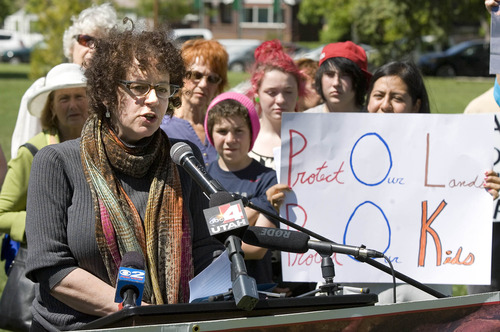This is an archived article that was published on sltrib.com in 2013, and information in the article may be outdated. It is provided only for personal research purposes and may not be reprinted.
Salt Lake City teen Ethan Lake grew up climbing and exploring Utah's mountains and canyons.
But now the West High senior is concerned that such experiences will not be available to his own kids if state political leaders achieve their quest to take control of Utah's public lands.
"We are truly blessed with a beautiful natural environment," Lake said Wednesday at a gathering in Liberty Park. "The governor is out of step with young people in Utah like me who grew up hiking and camping with their families on our federally owned forests and desert lands. We want to see these lands safeguarded for the future, not exploited for short-term gain."
A network of Utah educators and community leaders have organized the campaign For Kids and Lands, challenging the state's controversial public lands initiatives that they say hurt both the land and schoolchildren.
"I have seen young people open to the possibilities in their lives when they have the opportunity to experience our big Western skies and landscapes," Salt Lake City school board member Heather Bennett said. "We set a poor example for our children and dishonor the values of our ancestors when we arrogantly seek to seize and exploit."
The campaign seeks to shoot down Utah's Transfer of Public Lands Act, which demands the federal government hand over 30 million acres administered by the U.S. Forest Service and the Bureau of Land Management, including the Grand Staircase-Escalante National Monument and scenic redrock surrounding national parks.
Proponents argue that HB148, the act's enabling legislation passed last year, seeks more efficient management of public lands without degrading or selling them.
Not only will the land benefit, but so will schools because these lands could generate greater revenue for education under state management, top state officials say. Testifying before a congressional subcommittee Tuesday, Gov. Gary Herbert alleged federal land managers are failing to take care of the land and respond to local and state concerns.
"Millions of acres of national forests have fallen victim to bark beetles and other insect and disease plights and are at risk to catastrophic wildfire. At the same time, a good portion of our federal grazing lands throughout the West are in poor condition," Herbert said.
Nowhere in his testimony did the governor mention any of the state's many confrontational and litigious campaigns seeking to limit federal authority. But in a break from the angry rhetoric frequently heard in the Utah Capitol, he did not blame federal employees and called for greater federal-state collaboration.
"Most of these failures are symptomatic of outdated and non-functioning federal land management policies and processes," Herbert testified. "In short, the federal land management apparatus is massive. It's bureaucratic. And it is too rigid."
Herbert's administration has retained economists with Utah State University and the University of Utah to quantify what a land transfer would cost and what the state would reap in terms of mineral royalties and leases, timber sales, rents and other revenue streams.
But the HB148 critics assembled at Liberty Park Wednesday questioned the entire premise of transferring public land to the state, which they said has long demonstrated an antipathy to conservation and public involvement.
"These public lands would be thrown open to extraction activities or sold off to the highest bidder in an effort to maximize short-term revenues," said high school teacher Jim Thompson. "Moreover, they would become marred and scarred as the state seeks to develop a virtual spider-web of road rights of way."
Bennett believes the proposed land transfer only thwarts honest discussion about how to adequately support public education in Utah, which occupies the nation's bottom rung in terms of per-pupil funding.
"When litigation and increased management costs are added together, the state is likely to lose rather than generate money by pursuing this land transfer," she said. Even if the state succeeds in getting the land and making money off it, "citizens have no guarantee that the state Legislature would dedicate those funds toward public education."





